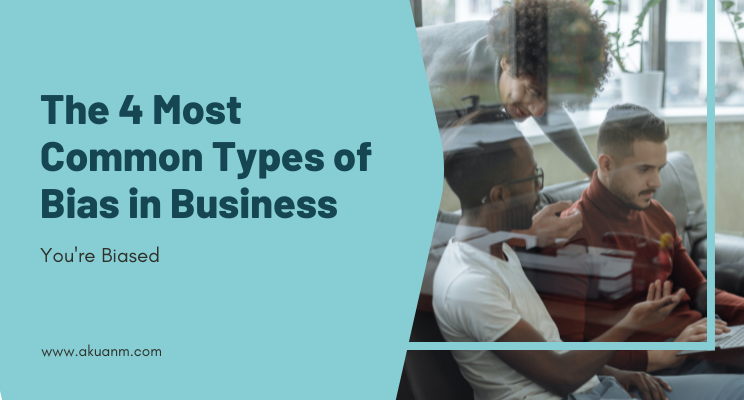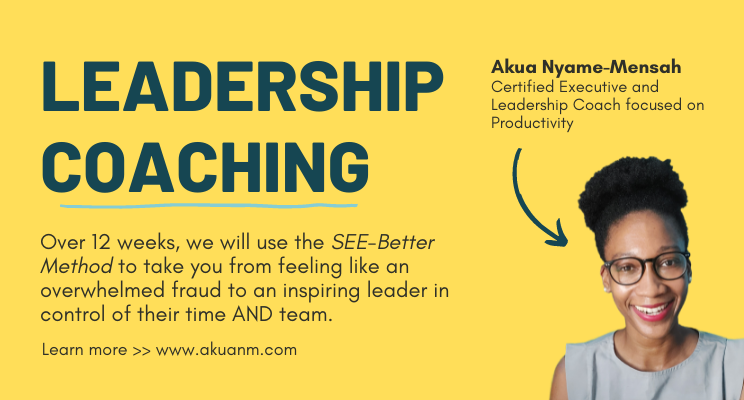The 4 Most Common Types of Bias in Business

Do you like to hire people who you feel are like yourself? Have the same values? Or have a certain education?
As human beings, we’re WIRED to have biases.
But what you have to ask yourself is this -
- When do my preferences become prejudices?
- When do my preferences become discrimination?
- When do my preferences get in the way of hiring the right people?
- And, where do these preferences come from?
The first step in being able to overcome your biases is recognizing the fact that they are natural.
A huge part of being an effective leader is learning to manage yourself first. When your preferences get in the way, then ultimately, you are not able to manage others effectively.
Did you know there are over 200 different types of cognitive biases?
If we want to succeed, we must build awareness of the things that could be holding us back on our road to success.
In this blog, I’m delving into the top 4 biases I see in myself and my clients in business. I’ll be talking about their characteristics, how they show themselves, and how to become aware of them. As well as sharing some examples from my own life, past clients, and some of the leaders that I've worked with.
Let's get right to it! 👇🏾
1/ Stereotype Bias
One of the most common things we do as human beings is jump to conclusions.
Stereotyping is expecting a certain group or person to have specific qualities without having any REAL information about that person. It allows us to quickly identify strangers as friends or enemies.
When we first evolved as a species, it was a survival mechanism. But now, we live in a VERY different world.
It's probably one of the most common biases in hiring and firing among leaders. We’re quick to jump to conclusions about who we think this person is and their ability.
In my personal experience, I get a lot of people reacting to me in a certain way because I have a very stereotypical Ghanian name. You can learn a lot about me just by looking at my name. But what people expect is often not true.
I've also seen leaders who will hire people based on their accents. They assume they know what someone is capable of, because of the way they sound.
The thing is - we're not always aware of our biases.
That's why becoming conscious of them can be so powerful. It will force you to create checks and balances, internally and externally. It will force you to take a second look and not jump to conclusions based on our assumptions.
What we can do, as leaders, is to recognize that that might be something that we're doing and create systems to work AROUND it.
This brings me to the second bias. 👇🏾
2/ Overconfidence Bias
Some of us are too confident in our abilities.
Let's just put it out there!
And this causes us to take greater risks in our daily lives. Experts are more prone to this bias since they are often more convinced that they must be right.
Overconfidence bias is something I see a lot in my space.
I consider that my clients are the expert in their life, and it's my job to help facilitate and guide them. Nevertheless, people are still coming to me for my expertise.
The thing to recognize here is, as leaders, we might be missing out on certain things or making certain decisions WITHOUT considering all the factors. We skip past important info because we’re just so confident in our abilities.
It's important to recognize balance. Yes, you do bring something to the table. But also take into account that you should have checks and balances to be making the smartest decisions possible.
The people on your team can also help you in creating that space. They can provide valuable suggestions, making sure that you're making decisions from the best perspective possible.
3/ Affinity Bias
We have an unconscious tendency to think we will get along with others who we perceive are 'like us.'
One of the things we will say is that we want people who can fit in. We want people who are like us. It's so easy to hire these people because we get along with them. We’re thinking about:
- Building our team
- Building our communities
- Building a healthy workspace
Affinity bias leads us to favorite people with whom we feel like we have a connection. If you're going to be out there networking or at an interview, you're always going to try and find common ground. It’s natural, right?
I recommend you think about some of these things when you're negotiating or bringing on someone new. It's key to being able to build solid work relationships.
BUT it's also important to know that those affinity biases are not always good. You need to look at the whole picture.
In my part of the world, there tends to be affinity bias around an ethnic group.
Or people will say, “I only hire individuals who went to school in the US.” I think this can be incredibly problematic because you are judging a person's competence and ability based on their background.
These factors don’t necessarily have anything to do with the results you’re looking to achieve.
You must be able to separate how you SEE an individual, versus what they're ACTUALLY able to achieve within your business.
Just because you have more preferred “superficial” traits or connections in common, doesn't mean that you have the values that will allow you to have long-term working relationships.
This leads me to my last bias. 👇🏾
4/ Confirmation Bias
Confirmation bias comes from our tendency to listen only to information that confirms our beliefs.
It's one of the many reasons why it’s so hard to have conversations about complicated issues. We listen only to information that affirms our preconceptions. Once again, this is why it’s so important for leaders to check in with some of their biases.
Sometimes as human beings, it’s hard to think outside the box and realize that we are prone to filter information.
We have beliefs that go a little like this - “Because this person is from here or did this, X, Y, and Z are going happen.” Then, when something happens based on that stereotype, we say to ourselves, “I knew that was going to happen!” and it reinforces our behavior.
It can be an issue when we're trying to lead teams, build teams, or build a business. Confirmation bias prevents us from recognizing that our decision-making patterns might be the real problem.
Understanding these four biases allows you to think critically about the internal and external resources you might want to leverage to make more informed decisions.
If you're interested in learning a little bit more about biases or the work I do around bias with leaders, please feel free to reach out.
I help people recognize these biases and work through how you can build systems to increase business revenue, lead productive teams, and ultimately have more time.
Tell me in the comments ⬇️ Did this article help you uncover any of your biases?
Leaders aren't born; they're made.
This 5-minute assessment will help you understand what leadership stage you're currently in so you can determine your next steps.
© Copyright 2023, Akua Nyame-Mensah | Terms & Conditions | Website by Rachelle Deem



0 comments
Leave a comment